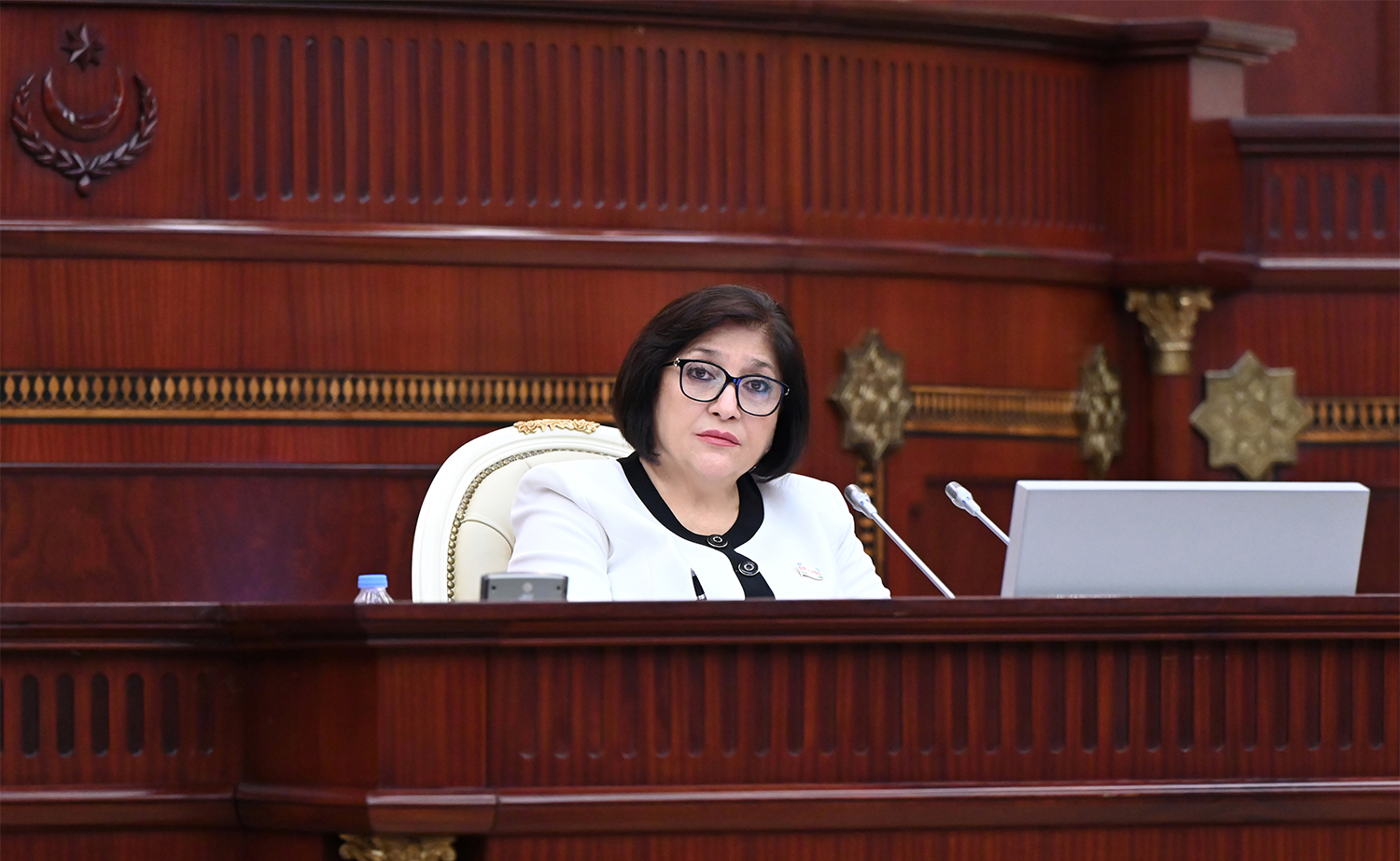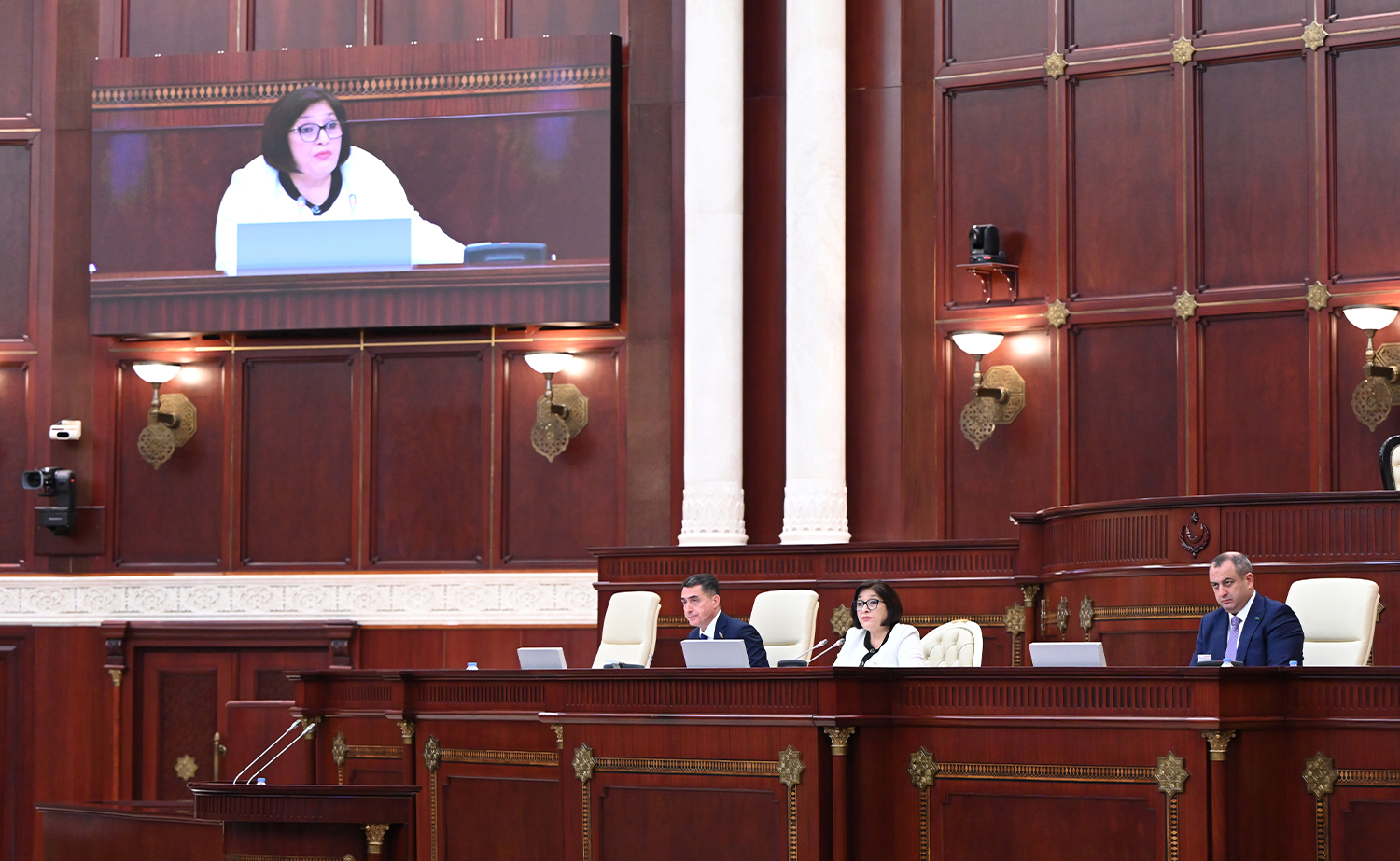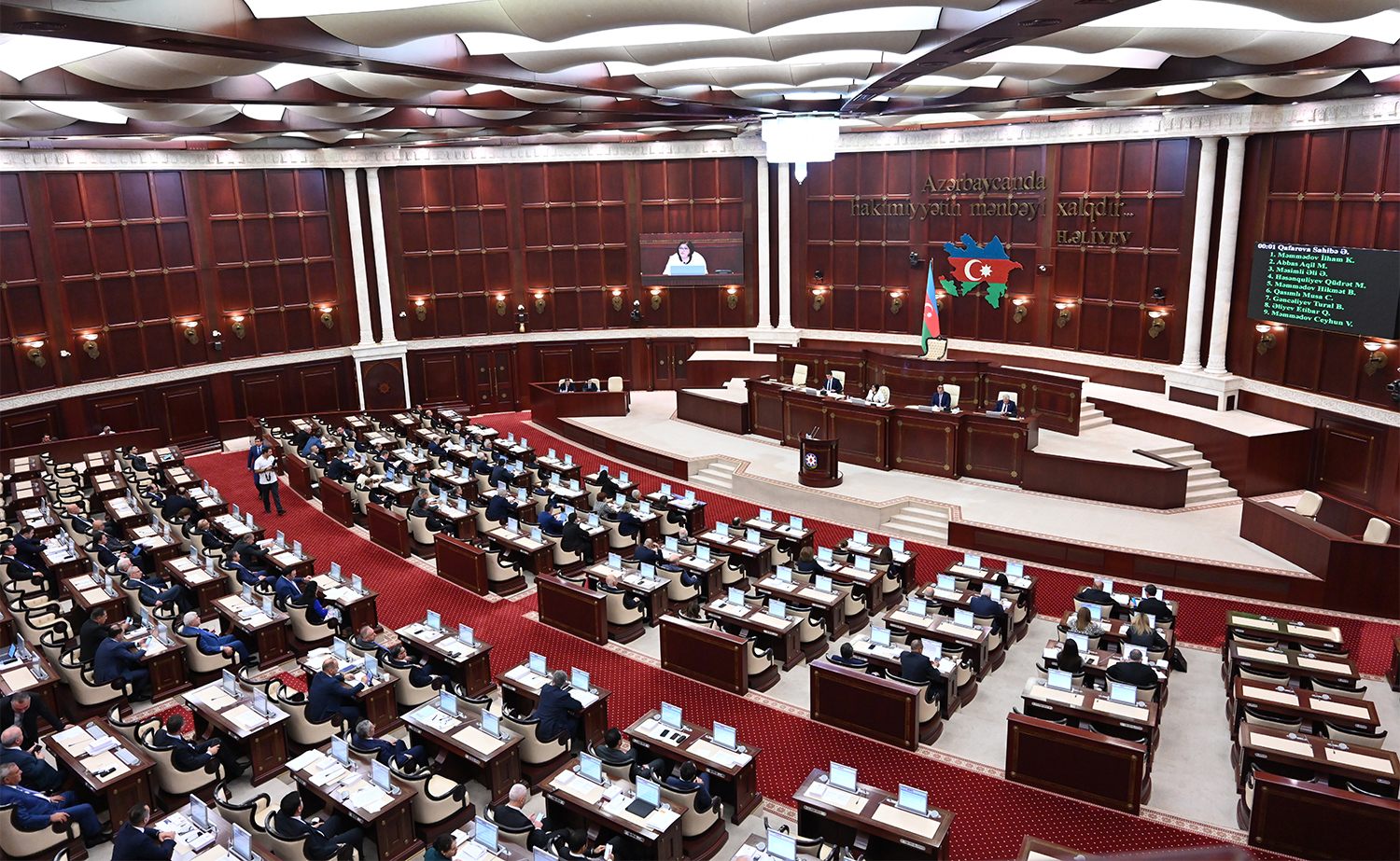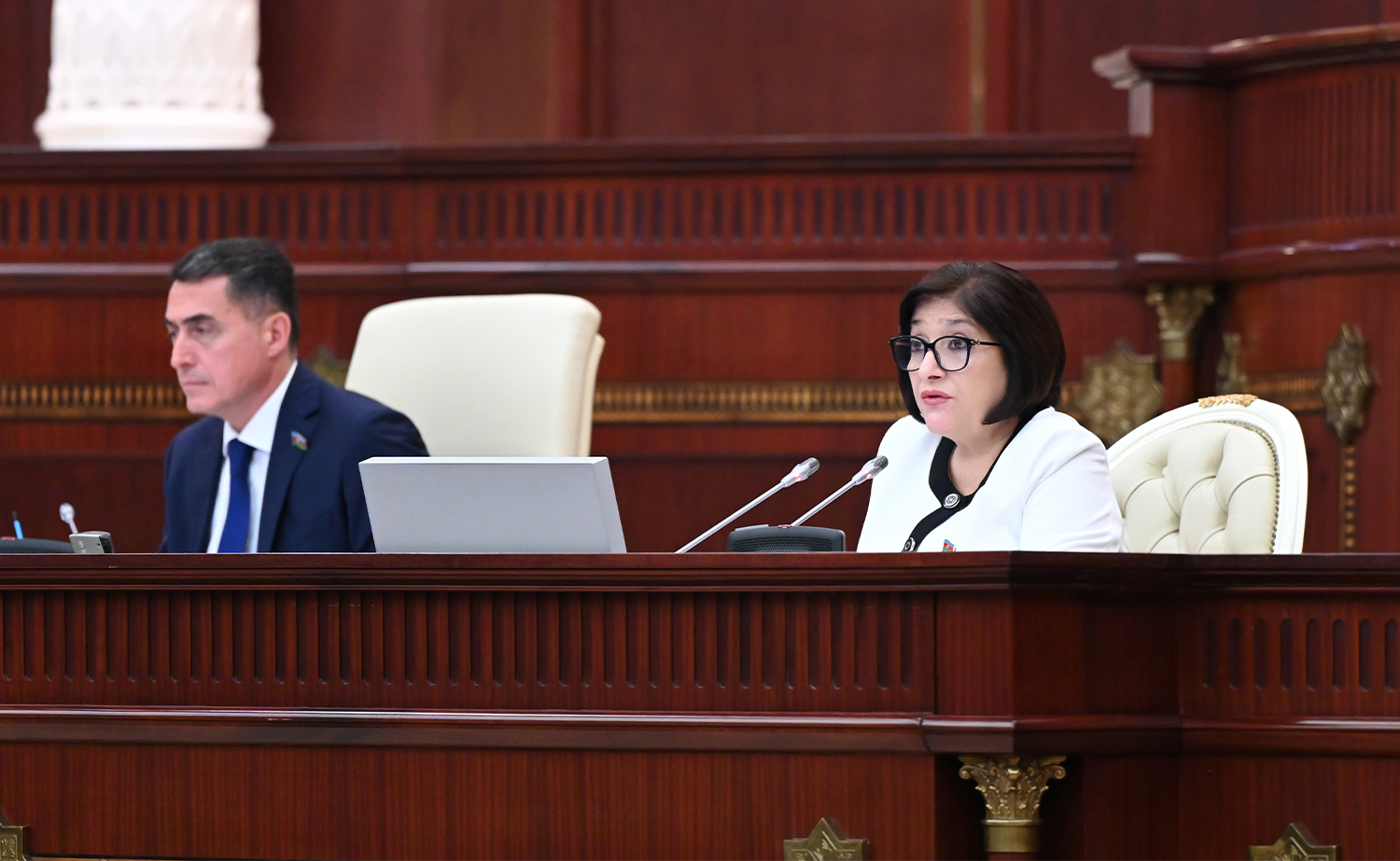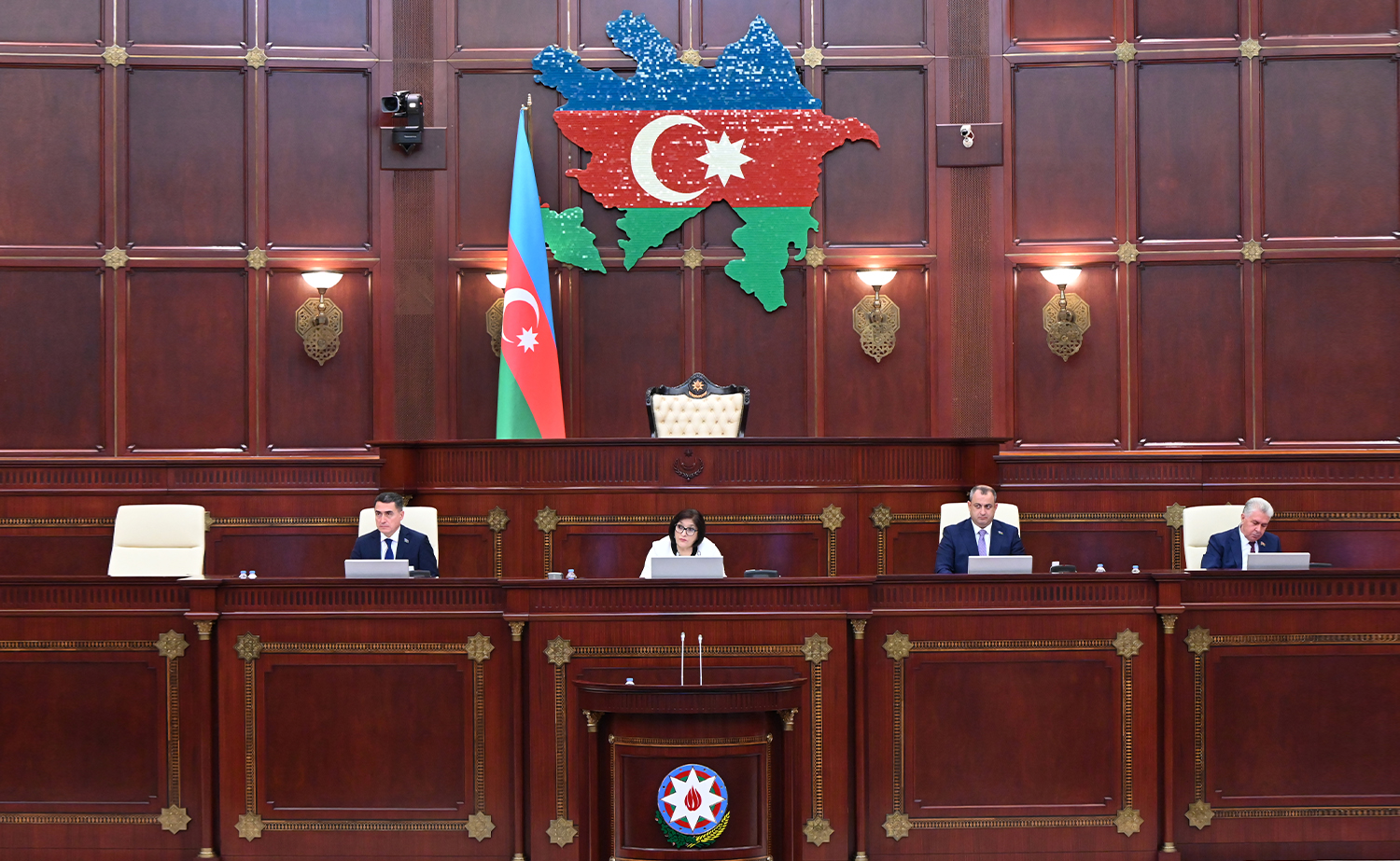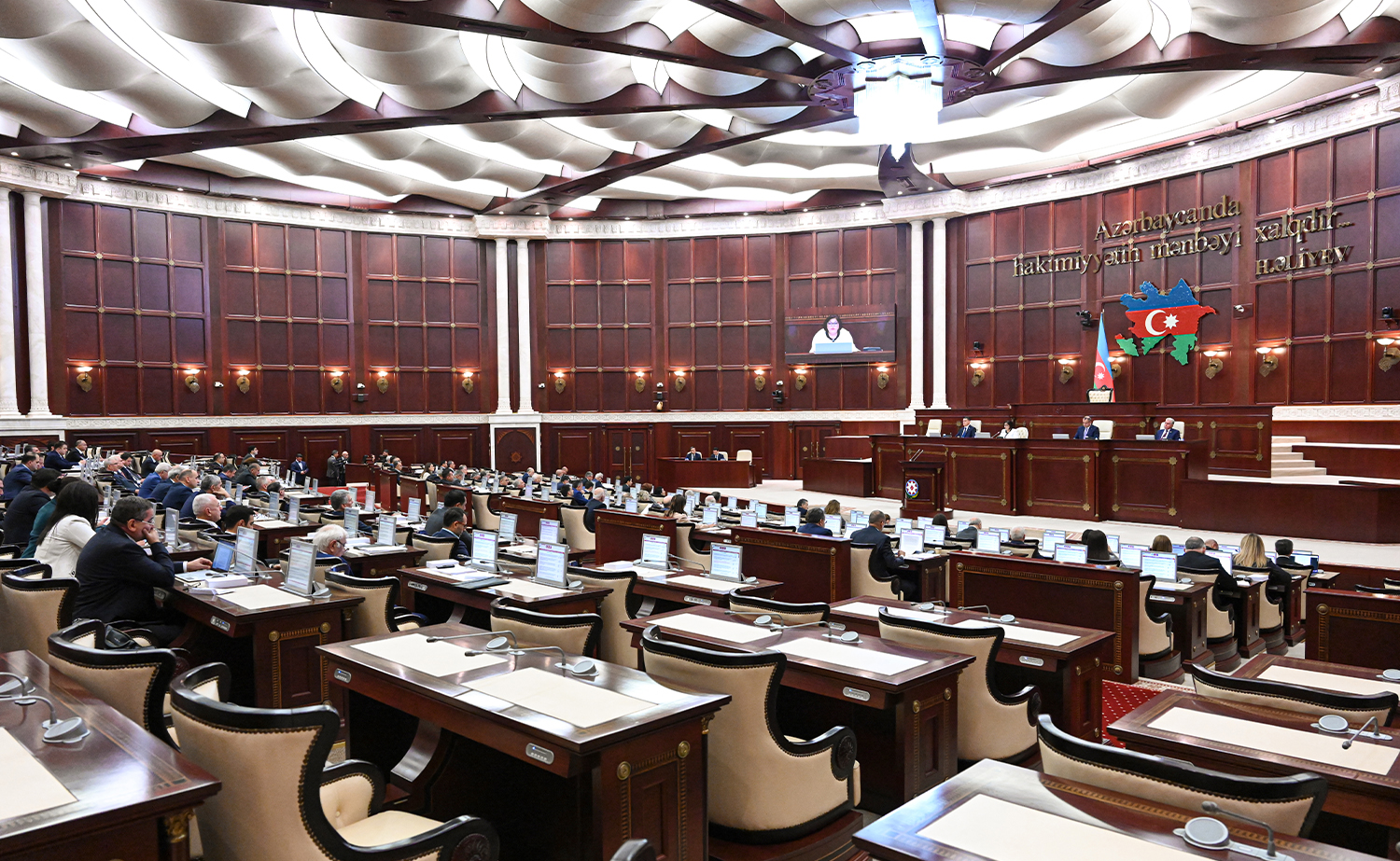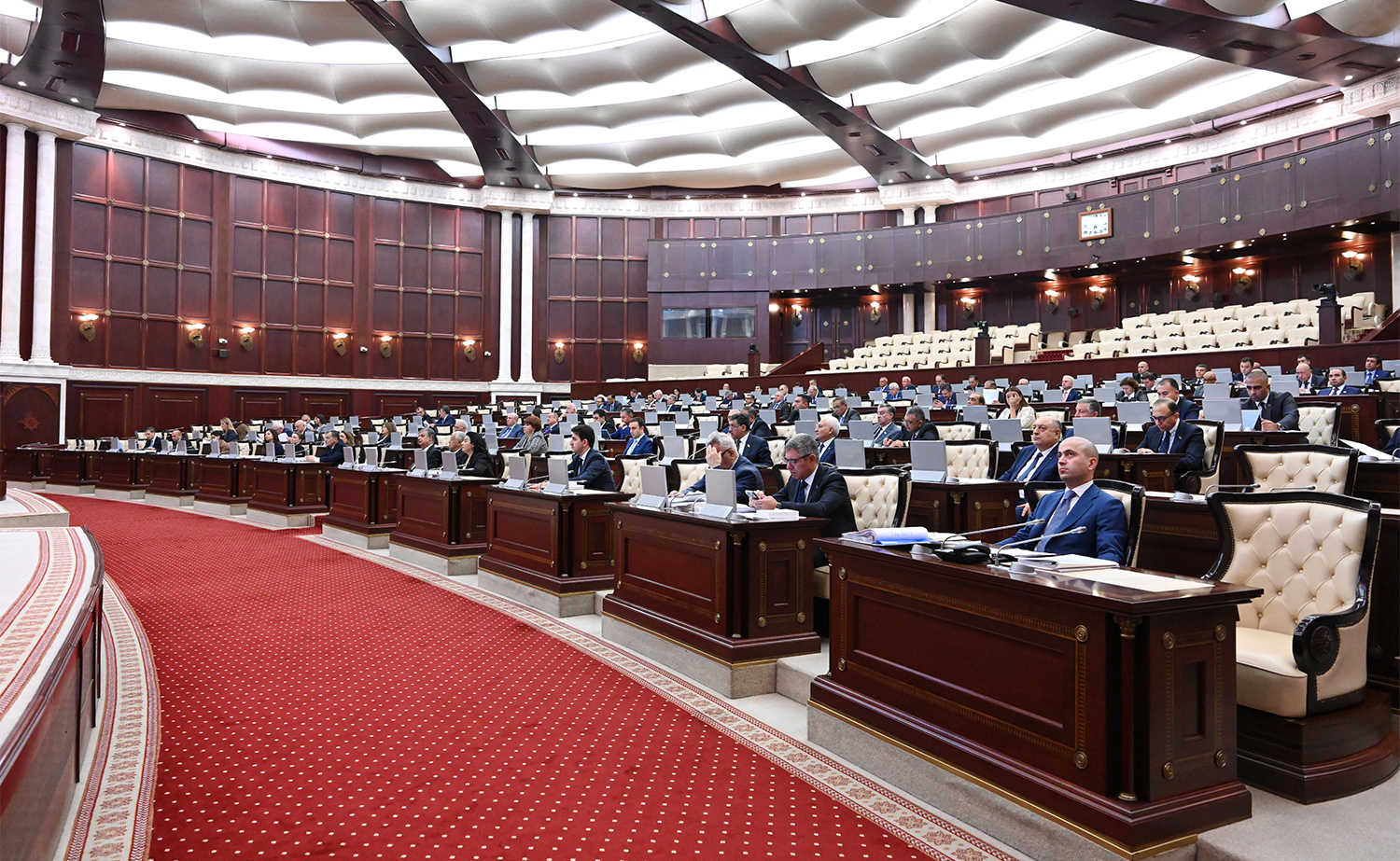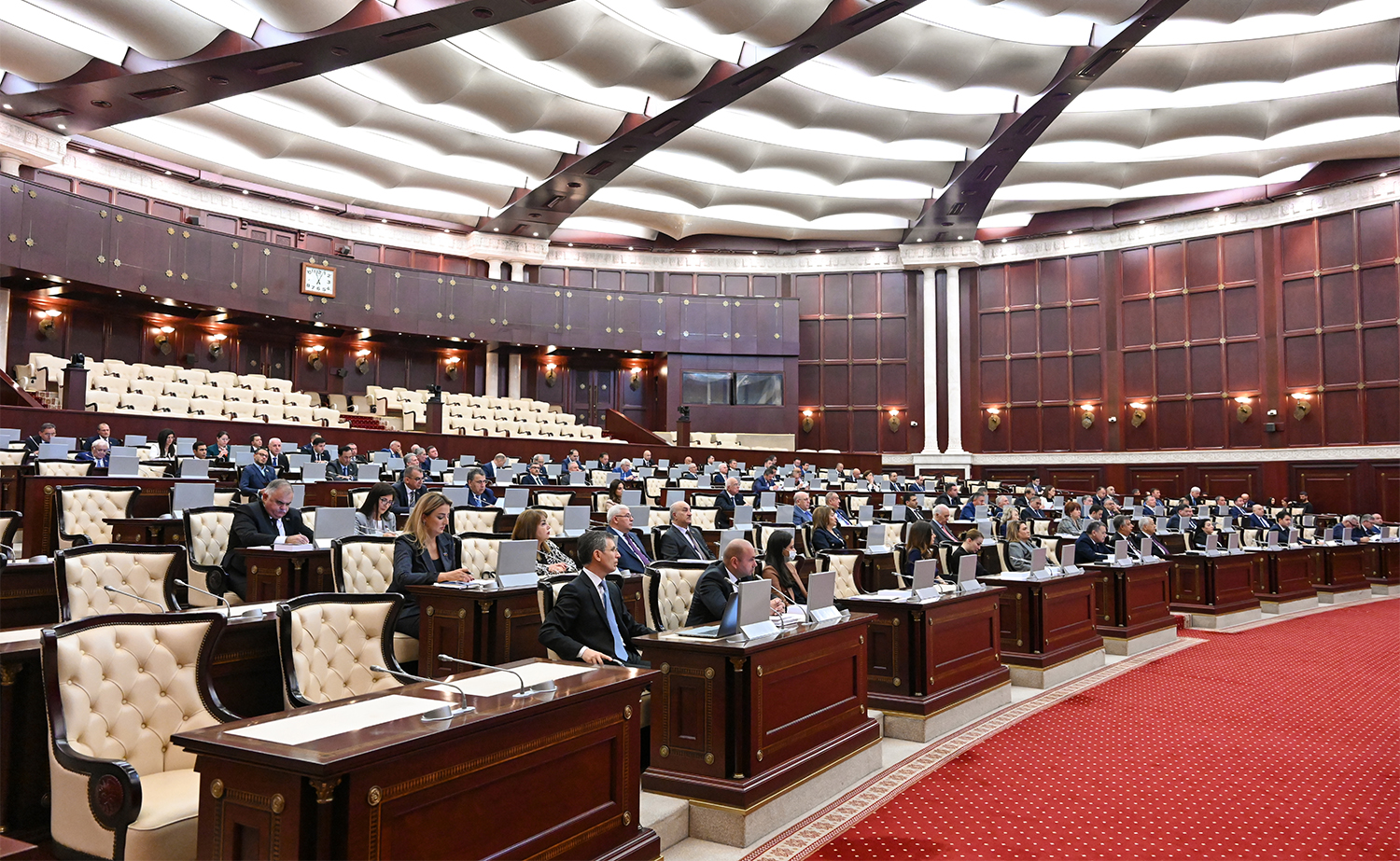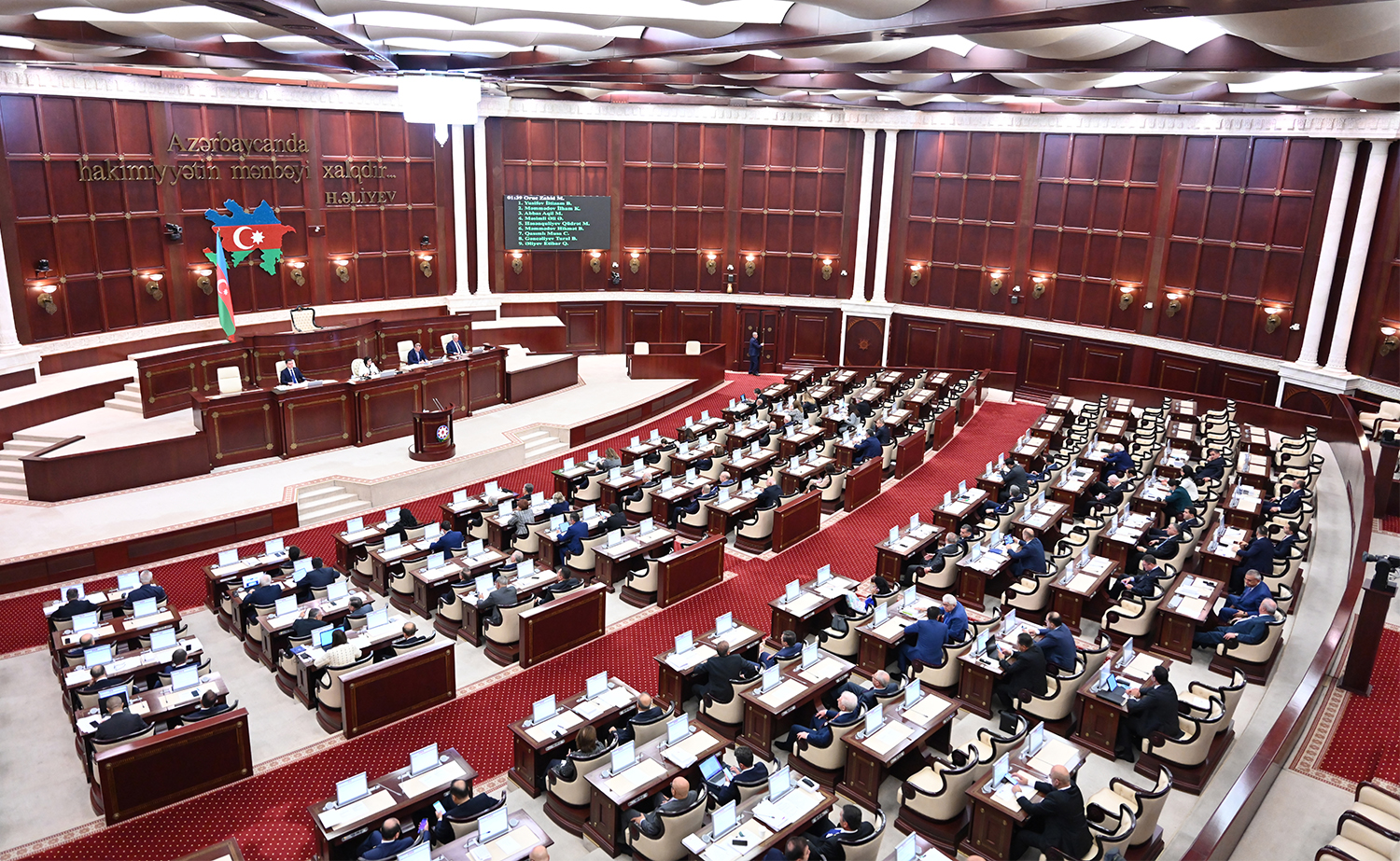At the Plenum of Milli Majlis
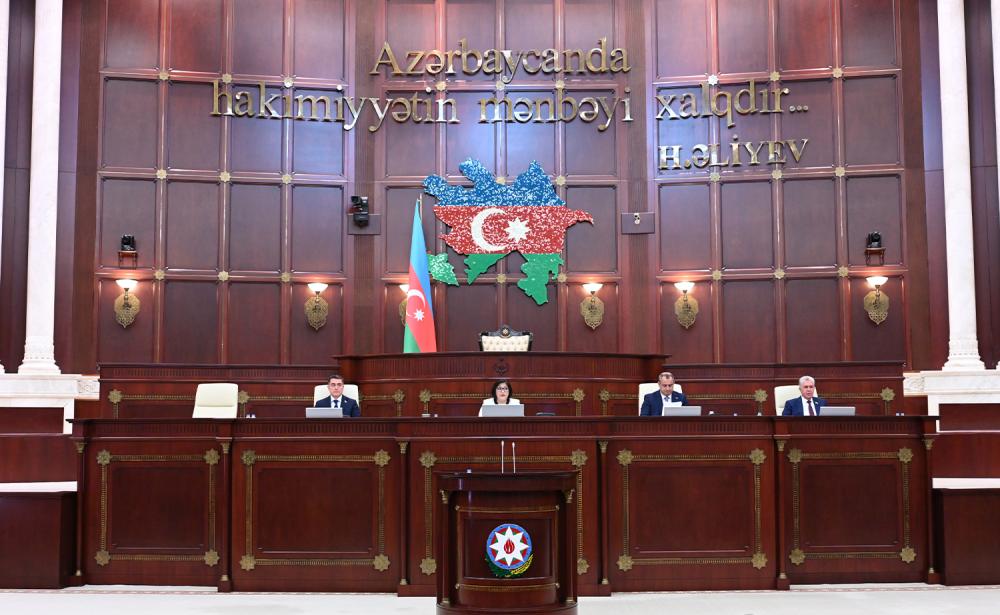
Another scheduled plenum of the Milli Majlis’ autumn session took place on 11 October.
First off, Speaker Sahiba Gafarova informed the House of the 8th summit of the G20 Parliament Speakers in Jakarta, Indonesia on 5-7 October – the gathering in which she had taken part both as leader of the Azerbaijani parliament and head of the Non-Aligned Movement’s Parliamentary Network.
That was the first time Azerbaijan was represented at the P20; and that occurrence in itself testifies to the attention and interest that both our country and the new parliamentary entity of the NAM are drawing to themselves.
Mrs Gafarova mentioned her two speeches at the summit’s events – including one delivered as a keynote speaker. In those, she had shared her thoughts about the modern challenges and underscored the tremendous role that parliamentary collaboration platforms could play in this field. Besides, Mrs Gafarova told the House, she had informed the participants of the summit in great detail of the NAM Parliamentary Network incepted upon the instance of the president of Azerbaijan Ilham Aliyev.
As she took the rostrum at the next session themed round food and energy security, then, Sahiba Gafarova talked about Azerbaijan’s achievements in maintaining her own food security as well as our contribution to our partners’ energy security, the efforts to promote local alternative energy generation sources and the gravity of security matters – both kinds, too – in the de-occupied Azerbaijani lands.
Going further, the Chair of the Milli Majlis told about the factors hindering solution of international-scale problems, citing double standards and selective approaches as the kinds of treatment that Azerbaijan had herself experienced first-hand.
The leader of the Azerbaijani legislature had also underscored in her speech our country’s having enforced single-handedly the pertaining resolutions of the UN Security Council as well as the international law’s norms and principles with the termination of the thirty-year-long occupation of the Azerbaijani lands by Armenia and with the restoration also of both Azerbaijan’s own territorial wholeness and historical justice. Mrs Gafarova, besides, mentioned Azerbaijan’s efforts to achieve lasting peace and stability in the region all through the period since the end of the 44 days’ war and Armenia’s having putting a brake on the peace process in general and the Armenian provocation of 13 September in particular.
According to Mrs Gafarova, she had seven meetings on the margins of the summit. There were conversations with Chair of Indonesia’s House of Representatives Puan Maharani, Chairman of the Grand National Assembly of Turkiye Mustafa Şentop, Speaker of the House of Commons of the UK Sir Lindsey Hoyle, Chairman of the Federal National Council of the UAE Saqr Ghobash, Chairman of the National Council of Namibia Lukas Sinimbo Muha, Chair of the National Assembly of the South African Republic Nosiviwe Mapisa-Nqakula and Deputy Chair of the Supreme Rada of Ukraine Olena Kondratiuk. Those centred on ways to promote the growth of the inter-state relations’ parliamentary aspect and other subjects of shared interest.
The talks with the officials of the NAM national parliaments had also seen exchanges of views upon intensifying inter-parliamentary interaction and co-operation, the workings of the new-born Parliamentary Network and its agenda.
Sahiba Gafarova had also had seven unofficial encounters, at which she had supplied her vis-à-vis with ample information about the post-war situation in the South Caucasus, the current reclamation of the de-occupied Azerbaijani lands, the steps that Azerbaijan is making in the name of lasting regional peace and stability, Armenia’s subversive stance at the talks conducted with the involvement of international mediators, Armenia continuing mining the territories after the end of the war and Armenia’s armed provocations.
The Head of the Milli Majlis mentioned her conversation with Moldovan PM Natalia Gavrilița on 10 October as she was completing her account at the plenum. There, the two had expressed pleasure at the level of the bilateral relationship and underlined the importance of the parliaments’ participation in furthering the Azerbaijani-Moldovan friendship and partnership.
The introductory speech by Sahiba Gafarova was followed by deliberations upon the issues du jour, with relevant comments coming from the committee heads Musa Guliyev, Ganira Pashayeva and Zahid Oruj. The recently-important subjects were also addressed by the MPs Soltan Mammadov, Sevil Mikayilova, Sahib Aliyev, Aydin Mirzazade, Iltizam Yusifov, Ilham Mammadov and Aghil Abbas.
The law-makers sent the well-deserved praise to the Azerbaijani president Ilham Aliyev’s participation of the European Political Community summit meeting in Prague on 6 October. The Azerbaijani leader’s participation in a quadripartite with French President Emmanuel Macron, President of the EU Council Charles Michel and Armenian PM Nikol Pashinyan in the Czech capital city brought Azerbaijan another diplomatic success, in the opinion of the Azerbaijani parliamentarians.
The MPs also commented on the current affairs and latest regional developments. They deplored the biased depiction by certain pro-Armenian forces in Europe of Armenia’s military provocations against Azerbaijan and put down this bias towards our country. They especially stressed the growing international situation of Azerbaijan, all due to her successful domestic and external policies.
Sahiba Gafarova then declared the agenda as containing 30 items the first 10 of which were about approval of various international documents.
With that, Nizami Safarov of the Law Policy and State-Building Committee Nizami Safarov tabled before the House a Bill to ratify the 4th additional protocol to the European Convention on Extradition, which protocol, he pointed out, modernised and supplemented certain provisions of the Convention and which Azerbaijan had signed with several reservations and declarations.
Chairman of the Human Rights Committee Zahid Oruj let the Assembly know what he thought of the document before stating the relevant resume of his committee; Elman Nasirov of the International and Inter-Parliamentary Relations Committee, in turn, presented to the House the favourable opinion statement about the document of that committee.
A parliamentary committee chairman Siyavush Novruzov and the MPs Azay Guliyev, Javid Osmanov and Malahat Ibrahimghizi felt it necessary to speak their minds, after which the Bill was voted in.
Mazahir Efendiyev of the Economic Policy, Industries and Enterprising Committee tabled a Bill on approving the Constitutive Treaty of the Islamic Corporation for the Insurance of Investments and Export Credit (ICIEC), concluded on 19 February 1992 to strengthen economic relations among the member states of the Organisation of Islamic Co-operation, based on Islamic principles and ideas, as well as to facilitate increased trade amongst them. The ICIEC was founded as a subsidiary of the Islamic Development Bank in line with all the 8 chapters and 64 articles of the Treaty, which, by the way, also regulates promotion, protection and making of investments amongst the OIC member-states.
MP Elman Nasirov presented the House with a favourable conclusion about the Bill of the International and Inter-Parliamentary Relations Committee whilst his colleague Jeyhun Mammadov spoke on his own behalf – and the Bill was voted in after that.
Mazahir Efendiyev also brought before the House a Bill of approval of the Charter of the Standards and Metrology Institute for Islamic Countries (SMIIC), following which the SMIIC’ agenda includes elimination of any and all factors liable to hinder the trade amongst the member-states in the products, processes and systems encompassed by standardisation. Furthermore, the scope of the SMIC incorporates elaboration of OIC/SMIIC standards to ensure maximal employment of economic opportunities raised by standardisation and to set up a compliance assessment scheme to promote exchanges in goods produced. Furthermore, the SMIIC deals with metrology and provides the standardisation and metrology staff of the member-states with training or further education opportunities, achieved, inter alia, through the efficient use of available tools and the exchange of information and experience.
The House heard the relevant conclusion of the International and Inter-Parliamentary Relations Committee before approving the Bill following the subsequent vote.
Chair of the Culture Committee Ganira Pashayeva introduced a Bill on approval of an agreement between the Government of Azerbaijan and the Islamic Educational, Scientific and Cultural Organisation (ICESCO), signed in Baku on 20 May 2022, according to which the ICESCO Regional Office would be stationed in the capital city of Azerbaijan and would enjoy the status of a legal entity empowered to conclude contracts in accordance with the national legislation, to lease and acquire movable and immovable property, to use and dispose of such property and to apply to the courts of the Republic of Azerbaijan. Officials of the ICESCO Regional Office shall be legally immune within the limits of their authority from verbal or written statements and all actions. The office staff will be provided with social protection and social insurance in accordance with the effective laws of the Republic of Azerbaijan.
According to MP Elman Nasirov, the International and Inter-Parliamentary Relations Committee had discussed the agreement meticulously and had voted pro subsequently. MP Etibar Aliyev shared his considerations. The Bill was put on vote and approved then.
Head of the Economic Policy, Industries and Enterprising Committee Tahir Mirkishili introduced to the Assembly a Bill on approval of an inter-governmental Azerbaijani-Israeli air traffic agreement the provisions of which are subject to the applicable provisions of the Chicago Convention. The parties to the agreement grant each other the right to fly over their territories without landing and to land for non-commercial purposes. Further, they grant each other the rights stipulated in the agreement to perform international air transport on certain routes.
The vote that saw the Bill approved by the Milli Majlis followed the relevant resume provided by the International and Inter-Parliamentary Relations Committee.
Elman Nasirov who is a member of the above-said parliamentary committee proceeded to table a Bill designed to approve a treaty between the Government of the Republic of Azerbaijan and the Federal Council of Switzerland about paid work done by those in the entourages of diplomatic missions, consulates and permanent missions of the parties to international organisations. It follows from the agreement that such persons are allowed to engage in paid work. Simply put, Azerbaijanis can do that in Switzerland and Swiss in Azerbaijan.
Elman Nasirov also tabled a Bill to approve an inter-governmental agreement between the Republic of Azerbaijan and the Kingdom of Cambodia about non-visa travels of diplomatic passport holders. The idea behind this is to promote bilateral friendly relations and facilitate the movement and travel between the two countries – for their respective citizens holding valid diplomatic passports.
This Bill, too, was voted upon favourably.
Chairman of the Agrarian Policy Committee Tahir Rzayev gave an overview of a Bill on approval of a memorandum of understanding between the Food Security Agency of Azerbaijan and the Food and Veterinary Service of the Republic of Lithuania concerning co-operation in food security. MP Rzayev remarked that the memorandum aimed to bolster mutual responsibility and exchange of experience as well as co-operation in providing the security of imported and exported foodstuff.
The Bill was voted in after the Milli Majlis had heard the relevant conclusion of the International and Inter-Parliamentary Relations Committee.
Next, Chairman of the Economic Policy, Industries and Enterprising Committee Tahir Mirkishili came up with a Bill of approval of an agreement which the Republic of Azerbaijan and the Organisation of Economic Co-operation and Development had concluded through correspondence and which is about Azerbaijan’s becoming an associated member of the inclusive BEPS (base erosion and profit sharing) projects.
According to Mr Mirkishili, the agreement was concluded in the said manner on 26 November 2021 and 1 June 2022. The conditions and Azerbaijan’s modus participationis will be regulated by the general rules that apply to taking part in the Inclusive Framework meetings. Associate membership in the BEPS Project implies Azerbaijan's full participation in countering the BEPS practice through the Inclusive Framework and its established structures on an equal footing with members of the Organisation for Economic Co-operation and Development.
The House heard the relevant conclusion of the International and Inter-Parliamentary Relations Committee before putting the Bill on vote and seconding it.
Soltan Mammadov of the Labour and Social Policy Committee presented amendments to the laws ‘On Approval of the European Social Charter’, ‘On Joining the Convention on the Rights of Persons with Disabilities’, ‘On Joining the Facultative Protocol to the Convention on the Rights of Persons with Disabilities’ and ‘On joining the Marrakech Treaty to Facilitate Access to Published Works for Persons Who Are Blind, Visually Impaired or Otherwise Print Disabled’. Mr Mammadov said that the amendments were aiming to introduce to the national legislation understandable, unequivocal and exacting formulations.
Again, the Assembly first listened to the pertaining conclusions of the International and Inter-Parliamentary Relations Committee and, second, put the draft on law and voted it in.
MP Anar Mammadov, a member of the Economic Policy, Industries and Enterprising Committee, briefed the House on the amendments to the State Duty Law, which amendments, he added, had been drawn up to ensure enforcement of the Media Law of 30 December 2021 and envisage replacement of the wording ‘telecasts and regional broadcasts’ with the wording ‘a land television operator and a regional land broadcasting operator’.
The Bill was voted in, and with that came the turn of the next 17 items on the agenda being draft laws in the first reading.
First Deputy Chair of the Milli Majlis and head of the Law Policy and State-Building Committee Ali Huseynli brought before the House the separate amendments to the Criminal Code and the Code of Criminal Procedure, elaborated in both cases pursuant to paragraphs of the Council of Europe Convention on Laundering, Search, Seizure and Confiscation of the Proceeds from Crime and on the Financing of Terrorism. The amendments encompass solution of matters having to do with compensation disbursement procedures concerning persons victimised by such crimes as well as with restoring property to its lawful owners.
Comments were made by committee chairman Siyavush Novruzov and MP Gudrat Hasanguliyev after which the Bills were voted in one after another.
Chairman of the Defence, Security and Counter-Corruption Committee Ziyafet Asgarov overviewed amendments to the Statute of Military Servicemen’s Liability for Damage They Cause to the State, enacted with the law No 947 dated 10 January 1995. Mr Asgarov did not fail to mention the extensive military construction process afoot under the leadership of the Supreme Commander-in-Chief of the Armed Forces Ilham Aliyev.
The important matters of enhancing the logistics of the Armed Forces and keeping combat readiness at a high level – those matters which are being addressed as part of this process – are amongst the topmost state defence priorities, according to Mr Asgarov. His further commentary had it that the amendments now tabled had been called upon to optimise the bringing to account of the active military personnel and conscripts called up to boot camps for the full amount of unpaid compensations for the damage they dealt to the state by offending, on the administrative plain, against the rules of military service. The limits of financial liability for damage caused by other types of misconduct of servicemen and cadets in compulsory military service that do not entail criminal or administrative liability are to be increased from two to three months' pay and, for all the other servicemen categories, from one to two months' pay.
Besides, the tabled Bill contains a number of optimising amendments, it was said.
The Bill was approved in the first reading and then a break in the plenary sitting was announced.
Chair of the Milli Majlis Sahiba Gafarova said after the hiatus that the agenda items 15 and 16 had arrived in one package from the President of the country and were akin to each other substance-wise.
Aydin Huseynov of the Economic Policy, Industries and Enterprising Committee presented the draft amendments (in the first reading) to the Tax Code. Since Part 1 of Article 16 of the Antimonopoly Activity Law empowers the antimonopoly controlling body to obtain any information necessary for the performance of its duties and functions from government agencies, economic operators and officials – which information includes written and oral explanations regarding violations of the antimonopoly legislation, the new edition of Article 30.6.5 of the Tax Code introduces corresponding accommodations and adjustments. Besides, Article 30.6.15 is being added for more efficient organisation of the operations of the aforementioned state body.
Then, Nurlan Hasanov of the Law Policy and State-Building Committee came up with first-reading amendments to the Law ‘On the State Registration and the State Register of Legal Entities’. Article 15 of that law determines the range of (commercial legal) entities whose founders (participants) and shares in the authorised capitals of such legal entities are to be reported to the appropriate authorities has been determined, according to Mr Hasanov. Now, it is proposed to add to that array the antimonopoly body. Another amendment is on the adjusting side: under article 2 of the Enforcement Proceedings Act, decisions made by judicial and other authorities are to be enforced by executive-authority officials, so the amendment envisages replacement of the wording ‘to the compulsory enforcement body’ with the wording ‘to the official of the executive authority.’
Following the presentation, the Bills were put on vote and approved in the first reading one after another.
Thus came the turn of three interlinked agenda items, too, submitted by the president of the country as one parcel.
Chairman of the Agrarian Policy Committee Tahir Rzayev told about the first-reading amendments to the Land Code, which, he specified, set the legal basis for charging fees for the services related to determining the coordinates of curve points marking the boundaries of land plots, and for drawing plans and calculating the dimensions of such plots.
The same Tahir Rzayev also tabled the first-reading amendments to the State Land Cadastre, Land Monitoring and Land Use Planning Law. He told the colleagues that the document introduced the legal foundation for charging the land cadastre, land-monitoring and land-use planning fees as well as the technical cadastre and land-use documentation fees where such works are commissioned by state bodies, municipal entities as well as legal and physical persons.
Head of the Economic Policy, Industries and Enterprising Committee Tahir Mirkishili made a presentation of a first-reading addendum (a new Article 6.4) to the State Real Estate Register Law. This addendum imposes service charges in amounts to be determined by the authority designated by the relevant executive authority. These services are as follows: initial and repeated technical inventory of real estate, verification and entry in the state register of information on real estate as is related to the formation and transfer of real estate rights. In addition, the service list includes providing information from the state register on rights holders, descriptions and locations of real estate units, drawing up schematic address plans, providing mobile services for the reception and issuance of documents for the state registration of rights and, going further, drawing up and issuing expert opinions on land plots on the basis of land cadastral data and field measurement work results.
The MPs Vugar Bayramov and Arzu Naghiyev asked a few questions about the agenda items and, after Tahir Rzayev had answered those, all the three Bills were voted through the first reading one by one.
The plenum drew on. Chairman of the Economic Policy, Industries and Enterprising Committee Tahir Mirkishili told the House about amendments in the first reading to the Grant Law, saying that they established procedures for maintaining the register of grants referred to in the new section 2-2 of Article 3 of the law. Accordingly, the procedure for maintaining the register of grants covered by the above article will be determined by the body designated to do so by the relevant executive authority. This innovation is considered necessary to ensure transparency in the awarding of grants, to establish a system that is up to date in the field, to operate a unified information system containing the necessary grant information and, finally, to maintain the envisaged register according to common forms, methods and principles.
Comments were made by the MPs Etibar Aliyev and Shahin Ismayilov, complete with the responsive remarks by the parliamentary committee head Ziyafet Asgarov, after which the Bill was approved in its first reading.
A first-reading Bill containing amendments to the Tax Code was brought to the attention of the law-makers then. The presenting member of the Economic Policy, Industries and Enterprising Committee Mahir Abbaszade told the colleagues that the draft had been put together to regulate circulation of goods subject to the excises and other mandatory markings as well as in order to ensure tax control over importation, production, sales and turnover of such goods.
That Bill, too, was approved in the first reading.
Then, there was an overview of the first-reading Law “On the Promotion of Micro-, Small and Medium Enterprises’, presented by chairman of the Economic Policy, Industries and Enterprising Committee Tahir Mirkishili. Submitted for consideration of the Milli Majlis by the Head of State, the draft is immensely important for regulation and development of the area it is written to encompass, according to Mr Mirkishili who also mentioned the tasks put before the MSMEs in the National Socio-Economic Development Strategy for 2022-2026 and underlined the future law’s significance for hitting those targets.
Mr Mirkishili said, as he was talking about the composition of the 5-chapter, 15-article draft law that the relevant international experience had been duly scrutinised and that, in this particular case, the goals pursued are creation of a favourable ecosystem, stimulation of investments and innovations, helping the MSMEs into markets, seeing to it that their cut of the non-oil sector grows and, ultimately, that so does their contribution to the GDP. The main thrusts of the law are to serve SMEs locally, implement optimal tax policies, continue the simplification of the procedures already underway, increase knowledge and skills, and facilitate access to financial resources.
The draft law provides for the establishment of a permanent coordination group for MSME development by an institution determined by the relevant executive authority under the auspices of the competent authority. At the same time, the responsible authority is setting up a unified register that will include information on MSMEs. The procedure for maintaining such a register and the list of information to be included in it are determined by the Regulation on the Unified Register of MSME Entities.
Having done with that overview, Tahir Mirkishili proceeded to table a set of first-reading amendments to the Business Enterprising Law, saying that it had been proposed to replace the wording “the Law of the Republic of Azerbaijan” with “…and Development of Micro, Small and Medium Enterprising” in Part I of Article 2 of the Law.
The MPs Vugar Bayramov, Elshad Mirbashir oghlu, Emin Hajiyev, Fazail Agamali, Gudrat Hasanguliyev, Sahib Aliyev and Mushfig Jafarov accompanied their responses to the Bill with remarks and proposals of their own.
The Bills were put on vote and approved in the first reading one by one then.
Mahir Abbaszade of the Economic Policy, Industries and Enterprising Committee brought up first-reading amendments to the Tax Code and to the laws ‘On the Social Insurance”, ‘On the Municipality Funding Basics’, ‘On the Health Insurance’ and ‘On the Encumbrance of Movable Property’.
The draft compendium is put together in accordance with the 3 December 2021 law modifying the Tax Code to envisage e-invoicing and e-waybills concerning transportation of marketable goods as well as execution of court decisions by the tax authorities on the sale of movable property belonging to taxpayers who have outstanding tax debts with a book value not exceeding AZN 5,000 through commercial networks. That same law also introduced a number of adjustments to the Tax Code. Furthermore, there are several amendments to the Social Insurance Law, proposed in view of the replacement, in the draft, of the expression ‘a receipt for payment of a fixed amount under the simplified taxation system’ with the wording ‘a receipt for payment of a fixed amount for the simplified taxation system and contributions for compulsory state social insurance and compulsory health insurance’.
As for the amendments to the ‘On the Municipality Funding Basics’ Law, they are coming up because only the only tax on privately-owned buildings and aquatic and airborne vehicles is subject to withholding in the municipal taxes whereas the tax levied on extraction of construction materials of local significance is classified as a state tax.
It is proposed to fix the obligations of the compulsory health insurants in the Health Insurance Law in connexion with that it is the tax authorities that collect the pertaining fees.
Next, it is proposed to make certain changes in the Tax Code in view of the Real Estate Encumbrance Law’s stipulation of the circumstances pertaining to the encumbrance (conclusion of pledge agreements to extend the tax liability and registering movable properties owned by the taxpayers and suitable for sale).
The Bill was adopted in the first reading after the House’s listening to chairman of the Labour and Social Policy Committee Musa Guliyev, chairman of the Regional Affairs Committee Siyavush Novruzov and chairman of the Health Committee Ahliman Amiraslanov, with all the three voicing their respective committees’ support for the document.
The meeting in plenary continued as chairman of the Economic Policy, Industries and Enterprising Committee Tahir Mirkishili proceeded to present a first-reading Bill containing amendments to the Budgetary System Law, the Unemployment Insurance Law and the Law on the Chamber of Accounts. Mr Mirkishili said that the document in question had been drawn up in execution of the 24 December 2021 law modifying the Budgetary System Law. Because ‘the aggregate financial balance for the territory of the Republic of Azerbaijan’ (12.1.19) had been deleted from Article 12 of that law, it is now proposed, therefore, to rescind Article 1.1.22 (the concept of an aggregate financial balance) as well as to adjust Article 15.4 in accordance with Article 7 of the same law.
Furthermore, it is intended to abolish the requirement that annual reports should be submitted about financial transactions of the State Social Protection Fund and the Unemployment Insurance Fund (had been submitted together with the annual state budget performance accounts until now).
It was said then that the Chamber of Accounts gave opinions on the draft estimates of the state extra-budgetary funds provided for in Article 1.1.31-1 of the Budgetary System Law and on the annual reports on the implementation of those estimates. According to Article 1.1.31-1, this includes the State Oil Fund, the State Social Protection Fund and the Unemployment Insurance Fund. The said requirements of the law in question are also stipulated in the corresponding articles of the Chamber of Accounts Law.
Head of the Labour and Social Policy Committee Musa Guliyev made known the committee’s favourable resume about the document and the MPs Ali Masimli and Etibar Aliyev shared their own remarks – answered by Mr Guliyev eventually.
The Bill was voted through the first reading then.
Mashhur Mammadov of the Economic Policy, Industries and Enterprising Committee told the House about first-reading amendments to the State Duty Law, specifying that the Bill had been drawn up in connexion with the abolition of the state fee for veterinary certificates for the transport of veterinary goods. The ultimate goal here is to strengthen state support for entrepreneurship and consumer protection as well as to prevent steep price rises for products of animal origin.
Chairman of the Agrarian Policy Committee Tahir Rzayev offered his committee’s positive conclusion regarding the amendments before tabling a set of first-reading amendments to the Veterinary Law. Similarly to the amendments previously discussed, this one also abolishes the already mentioned state duty for veterinary transport, which is a positive change and should serve to promote the business.
First, the Assembly listened to what remarks MP Naghif Hamzayev had to make; then, the Bills were put on vote and approved in the first reading in a queue.
First Deputy Chair of the Milli Majlis and head of the Law Policy and State-Building Committee Ali Huseynli informed the House of draft amendments (in the first reading) to the Civil Service Law. Those amendments have to do with defining the administrative duties of civil servants taking up posts in newly created public bodies to the appropriate columns in the classification table - in order to improve public administration.
The Bill was approved in the first reading subsequently.
Chair of the Milli Majlis Sahiba Gafarova then introduced the last two items on the agenda as being second-reading Bills, akin in substance and submitted by the Head of State in one package.
Deputy Chairman of the Economic Policy, Industries and Enterprising Committee Ali Masimli talked about the amendments to the Compulsory Insurance Law. As he said, there are plans to integrate the electronic information system of the compulsory insurance office with those of the relevant state authorities as well as to make all compulsory insurance contracts and documents confirming insured events electronically. That is in order to simplify the compulsory insurance as a process and to ensure correct assessment of insurance risks.
A member of the Law Policy and State-Building Committee Nurlan Hasanov, in turn, informed the House of amendments to the laws ‘On Traffic’, ‘On Notaries’ and ‘On the State Register of Real Estate’. That compendium, too, envisages integration of the e-data system of the Compulsory Insurance Bureau with the opposite numbers of the other concerned state authorities, according to Mr Hasanov.
MP Ali Masimli made known the relevant favourable conclusion of the Economic Policy, Industries and Enterprising Committee. Pertinent remarks came from the MPs Razi Nurullayev, Rufat Guliyev, Iltizam Yusifov and Rashad Mahmudov.
With the deliberations eventually over, the Bills were put on vote and approved one by one, with which today’s plenary sitting of the Milli Majlis was over.
The Press and Public Relations Department
The Milli Majlis



